 |
Picks is a monthly sampling of Japan's art scene, offering commentary by a variety of reviewers about exhibitions at museums and galleries in recent weeks, with an emphasis on contemporary art by young artists. |
 |
 |
|
|
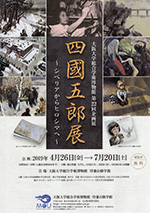 |
 |
| Goro Shikoku: From Siberia to Hiroshima |
| 26 April - 20 July 2019 |
Museum of Osaka University
(Osaka) |
 |
| Poet and painter Shikoku (1924-2014) was born in Hiroshima, spent three years in a Siberian prison camp, and returned home to find his brother had died in the atomic bombing. Thereafter he became an active member of Japan's peace movement. Besides paintings inspired by his wartime experiences and the Hiroshima bombing, this retrospective included sheets of antiwar poetry and pictures he posted in guerilla-like fashion around the city, The A-Bomb Poetry Collection and other works he collaborated on with fellow poet-activist Sankichi Toge, and illustrations for children's picture books like The Angry Jizo. |
|
|
 |
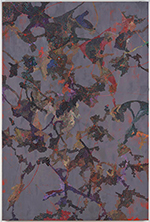 |
|
| Natsuko Sakamoto: A Yardstick for Straying: Drawing Constellations Among the Stardust of Signals |
| 13 - 19 June 2019 |
Anomaly
(Tokyo) |
 |
| Sakamoto's large paintings are covered in whole or in part by patterns that resemble nets, mosaics or grids, conjuring up landscapes viewed from high in the sky, or the dreamtime paintings that map the Australian Aboriginal cosmos. Also of interest are a series of "painting boxes" -- product cartons that the artist has painted over, with covers that can be lifted to reveal the contents she has created inside. |
|
|

|
 |
 |
|
 |
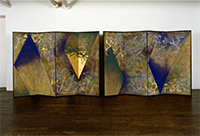 |
 |
| The Eighties: Naoki Suwa |
| 17 - 29 June 2019 |
Gallery Kobayashi
(Tokyo) |
 |
| Part of the gallery's series on art of the 1980s, this installment featured paintings by Suwa (1954-1990), who died prematurely in his mid-thirties. Borrowing the formats of classic Nihonga -- hanging scrolls, pairs of four-paneled screens -- he created what might be termed "abstract-expressionist nature paintings." His screen paintings, for example, combine abstract geometric shapes with fierce brushstrokes of gold and ultramarine blue pigment. For better or worse there is definitely something eighties-mannerist about these works.
|
|
|
|
|
|
|
|

|
 |
 |
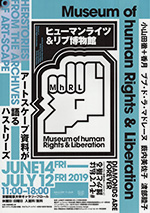 |
 |
| Museum of Human Rights & Liberation: Herstories from the Archives of Art-Scape |
| 14 June - 12 July 2019 |
Gallery Fleur, Kyoto Seika University
(Kyoto) |
 |
| Art-Scape was a shared space established in Kyoto in the early 1990s by members of the Dumb Type art collective along with like-minded gallerists and theatre producers. In the 1990s this space became a center for artists, students and activists engaged in social movements addressing AIDS, sexuality, gender and human rights issues. This retrospective eloquently demonstrated the links between '90s Kyoto and such present-day concerns as resisting political oppression and protecting the rights of women and sexual minorities. |
|
|
 |
 |
| Kazuki Akira: Playground |
| 14 - 30 June 2019 |
Gallery PARC
(Kyoto) |
 |
| Akira has taken the white cube of the gallery as a spatial extension of the white canvas, filling rooms with colorfully painted ready-mades or works by other artists reduced to monochromatic fields. By treating these as "paintings" he tests the limits of the concept. For this show he converted the gallery into a place of play by introducing sculptures resembling playground equipment, animal-like constructions, and even ice cream, with which visitors could create "melting paintings" by placing scoops of their choice of flavors atop a blank canvas. This whimsical approach, a departure from his more conceptual presentations, hints at a turning point in Akira's thought-experiments with "painting." |
|

|
 |
 |
 |
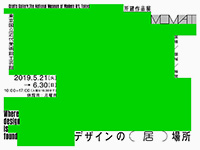 |
|
| Where Design Is Found |
| 21 May - 30 June 2019 |
Crafts Gallery, The National Museum of Modern Art, Tokyo
(Tokyo) |
 |
| This exhibition reviewed the history of design around the world since the industrial revolution. The conclusion? That designers of every era have always struggled with new challenges. In the days before mass production, when the only applied arts were hand-made, design barely existed as a concept. Only with the revolution did industrial designers emerge as an indispensable profession. Once the concept of design took root, though, its necessity became a given in all applied arts, industrial or not. |
|
|
 |
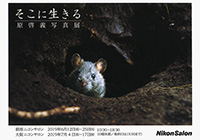 |
 |
| Hiroyoshi Hara: Living There |
| 12 - 25 June 2019 |
Nikon Salon Ginza
(Tokyo) |
 |
| For these photographs of mice seen on the streets of Shinjuku, Shibuya, Ginza and other busy Tokyo districts, Hara's theme is "switching sensibilities from the perspective of humans to that of mice." And indeed, his images give us a very real and poignant sense of what it is like to be a mouse -- peering out from your nest, scavenging in trashcans, fleeing from crows, pigeons, and people. A scene of a janitor sweeping up the carcass of a mouse tossed by the roadside even stirs up a twinge of pity. Animal snapshots like these, we don't see much. |
|
|
|
|
|
|
|
|
 |
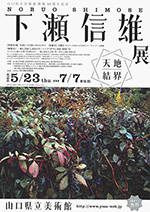 |
 |
| Nobuo Shimose: Boundaries in Nature |
| 23 May - 7 July 2019 |
Yamaguchi Prefectural Art Museum
(Yamaguchi) |
 |
| A solo offering by photographer Shimose, who was born in 1944 in the old castle town of Hagi, Yamaguchi Prefecture. The focal point was a series capturing nature's hidden boundaries and displayed in a dramatically large digital print format. "Regional" photographers like Shimose are often given shorter shrift than those from Japan's major metropolitan areas. But as the example of the celebrated Tottori photographer Shoji Ueda proves, some turn "regionalism" to their advantage and construct a highly original visual world. Shimose also benefits from his roots in Hagi, a place blessed with natural and historical riches. |
|
|
|
|
 |
|